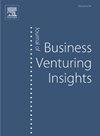干预儿童事务:个体户父母角色的探索性研究
Q1 Business, Management and Accounting
引用次数: 0
摘要
创业文献将个体经营者父母的子女日后成为个体经营者的较高可能性与父母的角色榜样和父母的社会化联系起来。我们增加了一项探索性研究,以检验父母对子女事务的干预是否为后来的创业奠定了基础。我们表明,平均而言,自雇父母并不比有正式工作的父母更有可能干预孩子的事务。然而,这种无效效应掩盖了父亲和母亲之间的差异。自雇父亲对儿子的事务干预较多,而自雇母亲对女儿的事务干预较少。此外,我们发现父母干预对儿子对自己创业能力的自我认知有负面影响。我们讨论了这些结果的含义,并提出了未来研究的有希望的途径。本文章由计算机程序翻译,如有差异,请以英文原文为准。
Interference in children’s affairs: An exploratory study about the role of self-employed parents
The entrepreneurship literature links the higher probability that children of self-employed parents will later become self-employed to parental role models and socialization by their parents. We add an exploratory study that examines whether parental interference in their children’s affairs lays the foundation for later entrepreneurship. We show that, on average, self-employed parents are not more likely to interfere in their children’s affairs than parents in regular employment. However, this null effect masks differences across fathers and mothers. Self-employed fathers interfere more in the affairs of their sons, while self-employed mothers interfere less in their daughters’ affairs. Moreover, we find that parental interference has a negative impact on sons’ self-perception of their entrepreneurial competencies. We discuss the implications of these results and present promising avenues for future research.
求助全文
通过发布文献求助,成功后即可免费获取论文全文。
去求助
来源期刊

Journal of Business Venturing Insights
Business, Management and Accounting-Business and International Management
CiteScore
11.70
自引率
0.00%
发文量
62
审稿时长
28 days
 求助内容:
求助内容: 应助结果提醒方式:
应助结果提醒方式:


